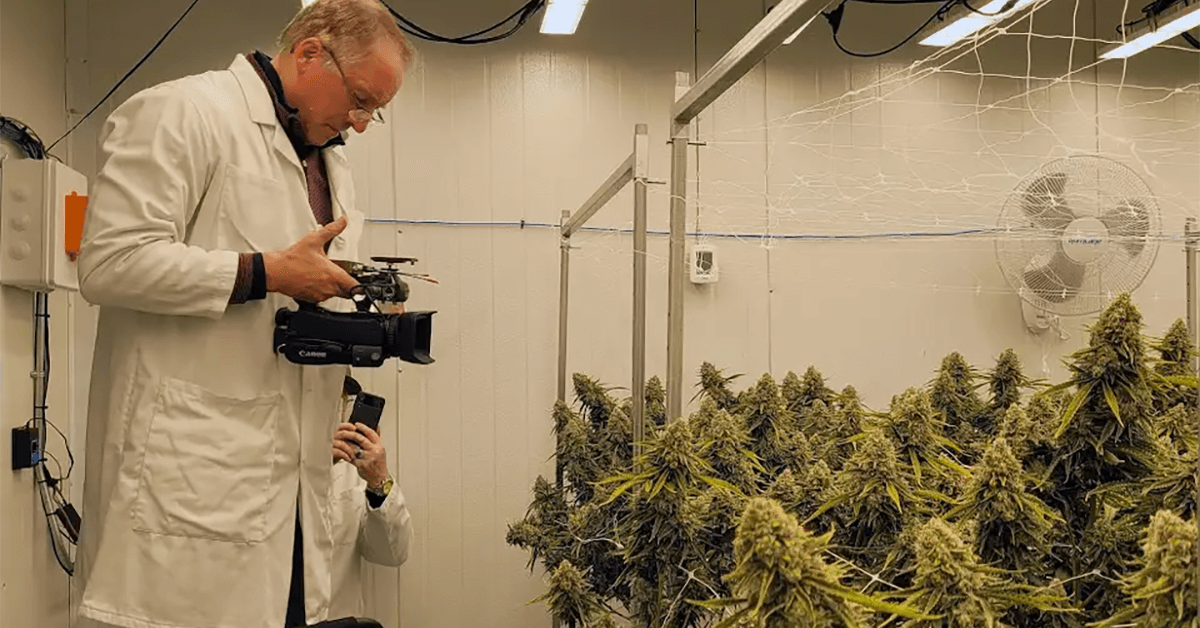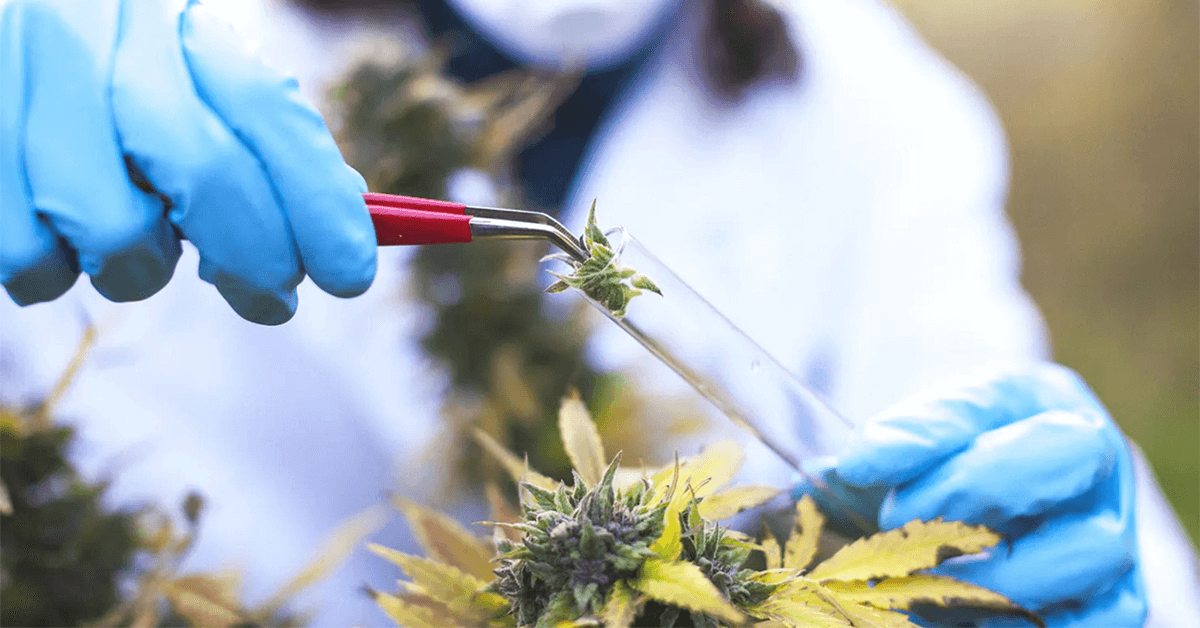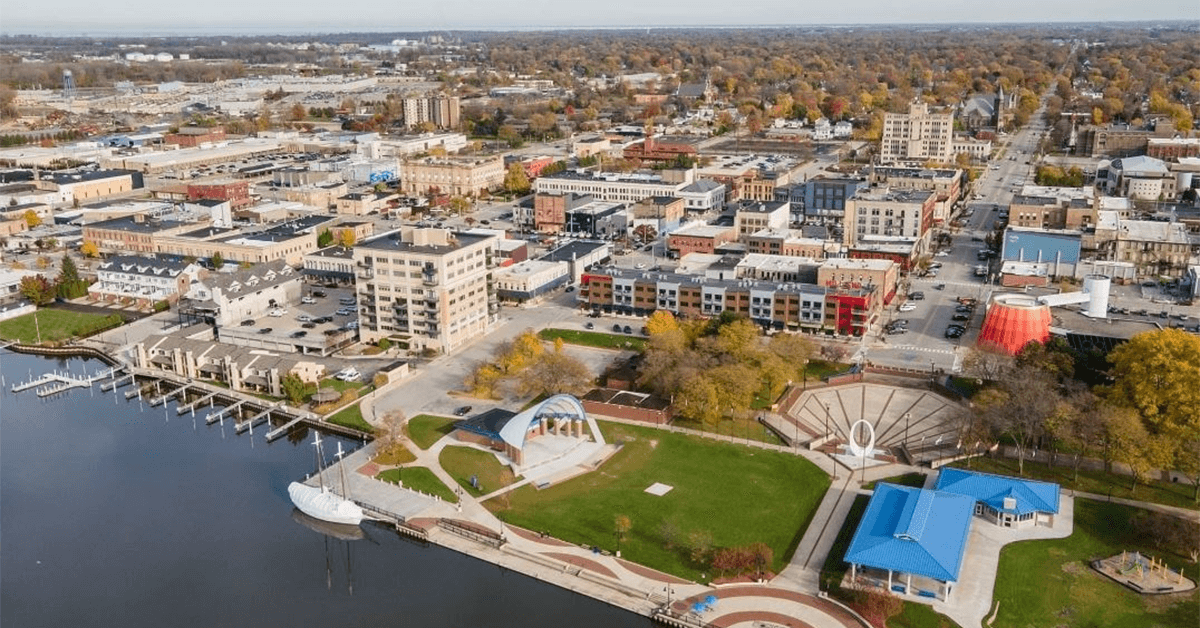The Business and Science of Cannabis Explored in New Michigan Documentary

The evolving cannabis industry in Michigan is the focus of a new documentary, "Cannabusiness: Marijuana on Main Street," which explores the commercial and scientific aspects of cannabis cultivation in the state. Set to premiere on Delta College Public TV at 8 p.m. on Tuesday, April 23rd, the documentary was produced by Ron Beacom and Bob Przybylski, who have previously collaborated on other local projects. For those with a PBS Passport subscription, the 58-minute film is available for viewing immediately.
"Cannabusiness: Marijuana on Main Street" aims to provide a comprehensive view of the cannabis industry, balancing perspectives from both proponents and critics. "We're not saying we're in favor of it; we also hear from those who have concerns," Beacom explained, expressing his hope that viewers will find the documentary informative and balanced, shedding light on the complexities of the industry.
The documentary came about following the success of Beacom and Przybylski's previous film, "Breached," which focused on the dam breaches in May 2020. With roots in Midland and Bay City, the duo felt it was essential to highlight the recent developments in their communities and the broader region. Przybylski noted the accessibility and openness of industry insiders, which was initially unexpected. "We thought it was going to be hard to get people to talk with us," he said, "They were more than willing. They were really happy to talk with us."
Throughout the film, viewers are introduced to the business aspect of the cannabis industry, showcased during a conference at Soaring Eagle in Mount Pleasant, where Przybylski was struck by the prevalence of financial and legal advisors. He emphasized the significant economic impact, the scientific advancements in cultivation, and the growing employment opportunities within the local community. "I'm really proud of it," Przybylski remarked. "There's a lot of information, and I think people are going to be surprised about the amount of money involved, the science, but also about the employment opportunities that are getting into the community."
Michigan Community Reflects on Cannabis Acceptance During Weed Day Festivities

Residents of Midland County, Michigan, gathered in large numbers at local cannabis dispensaries this Saturday to mark the annual celebration of Weed Day, with long lines seen at both Emerald Fire Farms in Coleman and LaCannaville in Sanford. This event, steeped in tradition even before the legalization of recreational cannabis in Michigan in 2018, has become a significant local celebration.
Jazmyne Dulong of Farwell, celebrating her first Weed Day, shared that she turned to cannabis in the past year as a means to manage her anxiety, depression, and ADHD. "Cannabis brings people together," Dulong noted, reflecting on the increased societal acceptance and the packed scene at Emerald Fire Farms.
Similarly, Jason Pegorch of Coleman highlighted the sense of community the plant fosters, especially evident during such gatherings. Pegorch, along with other attendees, appreciated the giveaways and the festive atmosphere at the dispensaries. Emerald Fire Farms was celebrating its third Weed Day, while LaCannaville marked its first anniversary since opening on Weed Day the previous year.
The sentiment that Weed Day has long been a holiday was echoed by several attendees, including Gage White of Sanford, who reminisced about times spent with friends enjoying cannabis even before its legal status. Dan Fenskie of Houghton Lake celebrated the legalization, recalling the days when he had to conceal his use of marijuana. "It's great they legalized it," Fenskie said, commenting on the overwhelming prevalence of cannabis use globally.
The legalization, according to Anthony Nelson of Sanford, has not only made cannabis more accessible but has also ensured the regulation of its quality, alleviating concerns about impurities or harmful additives which were common fears in the pre-legalization era.
The therapeutic benefits of cannabis were a common thread among discussions, with individuals citing relief from various medical conditions such as Parkinson's disease, chronic pain, bipolar disorder, and more. Dave Madison of Saginaw shared how cannabis has helped manage his Parkinson's symptoms more effectively than traditional pain medications.
Despite the festive and communal atmosphere, some attendees acknowledged the persistent skepticism and stigma surrounding cannabis use. Ted Provost of Sanford pointed out that not everyone has embraced the legalization and use of cannabis. However, many, like Penny Johnson of Sanford, believe that acceptance has significantly grown, viewing cannabis through a more open and informed lens.
As the community continues to navigate the evolving perspectives on cannabis, events like Weed Day play a crucial role in fostering dialogue and dispelling long-held misconceptions, paving the way for a more inclusive understanding of cannabis use both recreationally and medicinally.
Investigating Cannabis as a Treatment for HIV and Cardiac Conditions at MSU

Researchers at Michigan State University are actively exploring the health benefits of cannabis in treating a range of diseases, highlighting its potential anti-inflammatory properties. This research is particularly focused on diseases like HIV and diabetes, where inflammation plays a significant role in disease progression.
Professor Norbert Kaminski of the Department of Pharmacology and Toxicology is investigating how certain cannabinoids—the chemical compounds found in cannabis—might help delay neurocognitive disorders in HIV patients, conditions that are similar to Alzheimer's disease. His findings suggest that HIV patients who use cannabis exhibit lower levels of monocytes, a type of white blood cell implicated in the neurodegeneration seen in HIV by damaging neurons in the brain. This is in contrast to non-cannabis users with HIV, who show higher levels of these cells. Kaminski's research aims to isolate the beneficial effects of these cannabinoids from their psychoactive effects, potentially leading to the development of non-psychotropic synthetic cannabinoids that retain their anti-inflammatory properties.
In addition to Kaminski's work, Professor Omayma Alshaarawy from the Department of Family Medicine is studying the impact of cannabis on cardiac and metabolic health. Alshaarawy's work is critical in establishing whether the anti-inflammatory effects seen in animal studies hold true in humans. A key part of her research focuses on how cannabis is consumed, noting that most human users smoke the drug—a method that itself can induce inflammation and complicate health issues.
Alshaarawy emphasizes the importance of understanding both the beneficial and harmful effects of cannabis as its use becomes more widespread with legalization across many states. She advocates for a balanced approach, recognizing that while cannabis has potential health benefits, the mode of consumption and associated risks must be carefully managed.
This ongoing research at Michigan State University underscores the complexity of cannabis as both a medical and recreational substance, necessitating a nuanced understanding of its effects to optimize its use in a safe and effective manner.
Illinois Governor Highlights Economic Growth Through Cannabis Legalization

During a recent event in Grand Rapids, Michigan, Illinois Governor J.B. Pritzker emphasized the economic and social benefits of cannabis legalization, an initiative he aligned with Michigan's own advances in the industry. Speaking on April 20th—a date significant within cannabis culture due to its association with marijuana—Pritzker celebrated Illinois' success in legalizing adult-use cannabis, highlighting the positive impact on state revenue and job creation.
Pritzker noted, "I wanted to come up here on 4/20, because we, too, legalized cannabis in the state of Illinois, and I know that's been a boon to not only state revenues but also to business and job creation." His comments underscore the transformative potential he sees in the cannabis industry, not just in Illinois but as a model that could be mirrored effectively in Michigan.
On the social media platform X, Pritzker further expressed his pride in Illinois' role in fostering this burgeoning industry: "To be blunt: we're proud to have sparked a new industry when we legalized adult-use cannabis." His rhetoric not only celebrates the economic advantages but also the state's progressive stance on cannabis, positioning Illinois as a leader in the movement toward broader legalization.
The success in Illinois reflects broader trends in states that have embraced legal cannabis markets, suggesting significant economic opportunities through increased tax revenues and job creation. These developments are particularly noteworthy as more states consider similar legalization measures to capture the economic and social benefits observed in pioneering states like Illinois and Michigan.
This focus on the tangible benefits of legal cannabis underscores the broader potential for the industry to contribute positively to local economies and job markets, providing a template for other states considering similar paths.
Mia Ray's Entrepreneurial Leap into Luxury Cannabis with GRL Cannabis Club

Cannabis culture in the U.S. has dramatically shifted, moving away from longstanding stigmas and toward a broader, more inclusive understanding of its users and benefits. As states increasingly relax cannabis regulations, the industry sees a surge in entrepreneurial ventures that cater to diverse consumer needs. Among these, Mia Ray's GRL Cannabis Club stands out for its unique approach, aiming to destigmatize cannabis use among women and promote a luxury experience that blends wellness with indulgence.
Mia Ray, also known for her role as the CEO and founder of the luxury lifestyle brand GlamAholic, has ventured into the cannabis industry with a clear vision. Her initiative, GRL (Get Real Lifted) Cannabis Club, launched on April 20th, 2023, seeks to transform the perception of cannabis, especially among women who may have felt compelled to conceal their use in the past. Ray's message is clear and affirming: "It's OK to indulge," reflecting a significant shift from the negative perceptions that prevailed in the 1970s and 1980s.
Ray's inspiration for starting her cannabis brand stems from her personal experiences and a desire to reshape the market's presentation of cannabis products. She noticed a lack of luxury cannabis products aimed specifically at women who appreciate a light, fun, and flirty experience. This gap in the market led her to create a brand that not only offers high-quality cannabis products but also ensures that they are marketed as a luxury experience that women can enjoy without reservation.
GRL Cannabis Club prides itself on its commitment to education and quality. The company focuses on informing consumers about the various strains and benefits of cannabis, aiming to enhance their experience and knowledge, whether they are seasoned users or newcomers to cannabis. Ray emphasizes that using cannabis is not just about achieving a high; it's about unlocking creativity, managing anxiety, and discovering the therapeutic benefits of the plant.
On the marketing front, GRL Cannabis Club leverages its Instagram presence and direct engagement through dispensary representatives to educate both consumers and retail staff about their products, ensuring a luxury experience across all touchpoints.
As GRL Cannabis Club celebrates its first anniversary, Ray is excited about the future. With products currently available in 24 dispensaries across Michigan, plans are underway to expand the product line and reach. Despite the separation between her cannabis venture and GlamAholic, Ray's underlying mission remains consistent: to offer a sense of comfort and luxury that feels like a "warm hug."
This initiative not only highlights the evolving landscape of the cannabis industry but also underscores the growing representation and influence of women in this space. Ray's efforts contribute to a broader movement towards inclusivity and normalization of cannabis, redefining how it is perceived and enjoyed in society.
The Phoenix Effect in Bay City as Dispensaries Multiply Amid Closures

Since Michigan first legalized the sale of recreational cannabis, the landscape in Bay City has seen dramatic changes. Initially, local authorities anticipated that a modest number of dispensaries—just five—would suffice to meet the needs of consumers. However, nearly seven years on, the cap has escalated drastically to 50, reflecting the unanticipated growth in demand.
Despite this increase, the market dynamics have begun to settle. An influx of dispensaries across the state has led to a drop in cannabis prices, and subsequently, tighter profit margins. Currently, 17 out of the 50 dispensary licenses in Bay City have been issued, but no new applicants are emerging.
Terry Moultane, the city's planning and zoning manager, observed that the market is beginning to stabilize. "Even 50 was an unrealistic number for a population of this size," Moultane commented, noting that prime real estate for new dispensaries has become scarce, influencing where businesses can establish themselves.
In response to these market pressures, local business owners like Lyndia Matthews of Native Son Detroit have had to pivot their strategies. Matthews found that despite using Weedmaps—a popular online directory for cannabis dispensaries—to attract customers, the return on investment was insufficient. This led her to shift towards more direct forms of marketing such as digital advertising, local online promotions, and mail campaigns. "I want my money to work a little harder for me than what Weedmaps was doing," she explained.
The fluctuating market has seen many dispensaries open and close quickly, as not all are prepared for the slow pace of profit-making in this industry. "They're still coming into Bay City, but if you're not managing your business the way you need to, then yeah, you're going to be out of business," Matthews stated, emphasizing that success is not solely about offering low-cost products but also maintaining high quality.
Native Son Detroit has managed to stay afloat thanks to exceptional customer service and a strategic approach to pricing and staffing. Matthews operates with a cost-effective mindset, employing only part-time staff to keep overhead low—one of whom returned to her after leaving for a full-time position elsewhere that did not last.
As the industry looks toward potential federal legalization, Matthews is optimistic about expansion opportunities, suggesting that businesses like hers are positioning themselves advantageously for future developments.
Bay City officials like Moultane acknowledge ongoing challenges such as odor complaints from residents and minor regulatory infractions. However, the overall relationship between the city and its dispensaries remains positive.
As Bay City prepares for the annual April 20th "Weed Day" celebrations, Matthews anticipates a festive atmosphere with long lines, live music, and community barbecues, showcasing the city's robust engagement with its growing cannabis culture.


 Helpful Links
Helpful Links